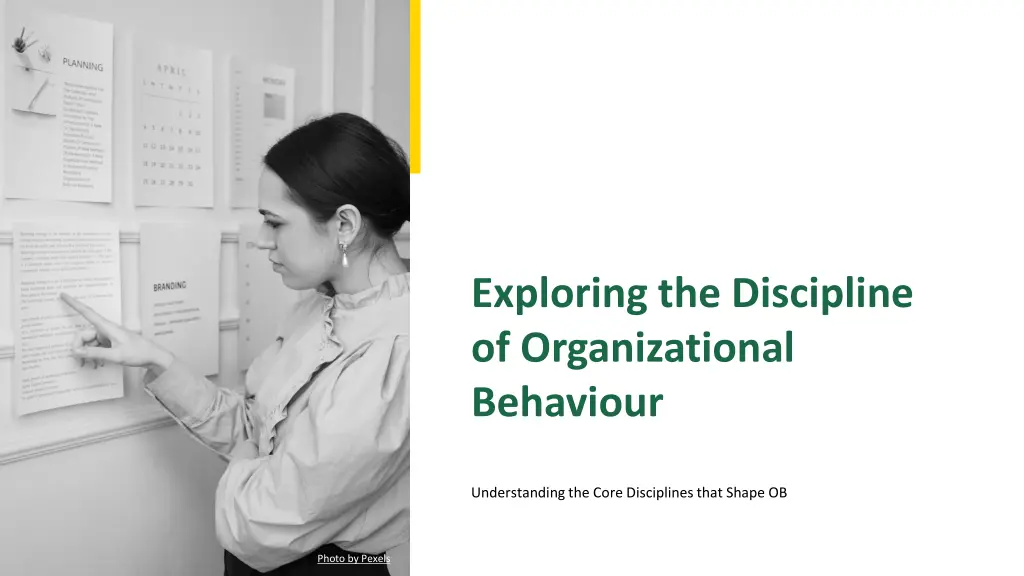
Understanding the Core Disciplines Shaping Organizational Behaviour
Explore the disciplines that shape Organizational Behaviour (OB) including psychology, social psychology, sociology, anthropology, and economics. Learn how these disciplines impact human behavior in organizational settings, influence decision-making, and enhance organizational effectiveness. Discover the importance of integrating these disciplines for future directions in OB.
Download Presentation

Please find below an Image/Link to download the presentation.
The content on the website is provided AS IS for your information and personal use only. It may not be sold, licensed, or shared on other websites without obtaining consent from the author. If you encounter any issues during the download, it is possible that the publisher has removed the file from their server.
You are allowed to download the files provided on this website for personal or commercial use, subject to the condition that they are used lawfully. All files are the property of their respective owners.
The content on the website is provided AS IS for your information and personal use only. It may not be sold, licensed, or shared on other websites without obtaining consent from the author.
E N D
Presentation Transcript
Exploring the Discipline of Organizational Behaviour Understanding the Core Disciplines that Shape OB Photo by Pexels
01 Introduction to Organizational Behaviour Table of Contents 02 Psychology in OB 03 Social Psychology in OB 04 Sociology in OB 05 Anthropology in OB 06 Economics in OB 07 Integrating Disciplines in OB 08 Conclusion and Future Directions
1 Introduction to Organizational Behaviour The Essence of OB in Modern Organizations Organizational Behaviour (OB) is the study of human behavior in organizational settings, the interface between human behavior and the organization, and the organization itself. Understanding OB helps in improving organizational effectiveness, enhancing employee satisfaction, and fostering innovation. OB covers a wide range of topics including human behavior, change, leadership, teams, etc. In the rapidly changing business environment, OB is crucial for adapting to new challenges and opportunities. Photo by Pexels
2 Psychology in OB The Psychological Foundations of Organizational Behaviour Psychology contributes to OB by providing insights into individual behavior,motivation, perception,and learning. Psychological theories such as Maslow's hierarchy of needs and Herzberg's two-factor theory explain what motivates employees. Understanding personality traits helps in predicting employee behavior and improving job fit. Emotional intelligence is key in managing interpersonal relationships and enhancing leadership effectiveness. Photo by Pexels
3 Social Psychology in OB The Social Dynamics within Organizations Social psychology examines how group dynamics influence individual behavior and decision-making. Effective communication is essential for teamwork and organizational success. Understanding social influence helps in managing change and fostering a positive organizational culture. Social psychology provides strategies for resolving conflicts and improving collaboration. Photo by Pexels
4 Sociology in OB The Sociological Perspective on Organizations Sociology studies how organizational structures impact behavior and performance. Embracing cultural diversity enhances creativity and problem- solving. Social networks within organizations influence information flow and innovation. Understanding power dynamics is crucial for effective leadership and decision-making. Photo by Pexels
5 Anthropology in OB Cultural Insights into Organizational Behaviour Anthropology helps in understanding the cultural aspects of organizations and their impact on behavior. Rituals and symbols play a significant role in shaping organizational identityand values. Managing across cultures requires understanding different cultural norms and practices. Ethnographic studies provide deep insights into organizational life and employee experiences. Photo by Pexels
6 Economics in OB Economic Principles in Organizational Behaviour Economics provides models for rational decision-making and resource allocation. Designing effective incentive structures is key to motivating employees and achieving organizational goals. Understanding market dynamics helps organizations adapt to external changes and remain competitive. Cost-benefit analysis aids in evaluating the potential outcomes of business decisions. Photo by Pexels
7 Integrating Disciplines in OB A Holistic Approach to Understanding OB OB integrates insights from various disciplines to provide a comprehensive understanding of organizational dynamics. The synergy of different disciplines enhances problem-solving and innovation. Applying interdisciplinary knowledge leads to improved organizational practices and outcomes. The future of OB lies in further integrating diverse disciplines to address complex organizational challenges. Photo by Pexels
8 Conclusion and Future Directions The Evolving Landscape of Organizational Behaviour Recap of the main contributions of each discipline to OB. Exploration of emerging trends in OB, such as digital transformation and remote work. Discussion on the challenges organizations face in implementing OB principles. Encouragement for organizations to embrace OB for sustainable success. Photo by Pexels
